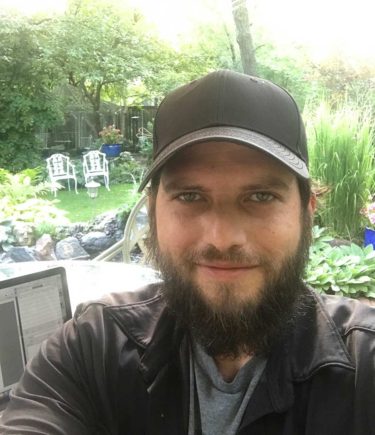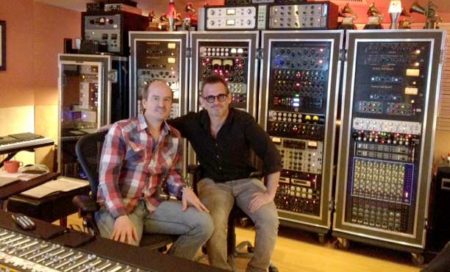Please fill out the following information, and RRFC Admissions will contact you to discuss our program offerings:
Issue #186
by L. Swift and Jeff McQ
 To hear Recording Connection grad Michael Shelton of Atlanta, Georgia tell it, a passion for music was always a significant part of his life. However, it didn’t become front-and-center for him until an accident at his job forced him to rethink his life plans.
“I was working a forklift, but there was a mishap to where I was down and out for a few years for health reasons,” he says. “So I was like, ‘What am I going to do from here on out?’…No matter what I was doing in the world or what I was doing at that time in my life, I always circled back to music regardless. I never really stopped writing…I had a book I would write hooks in all day. So I never really lost my sight for that, but when that happened, I had to figure something out.”
When Michael discovered that the Recording Connection could train him in a real recording studio in his hometown of Atlanta, he knew he had to grab the opportunity. Given his interest in rap and hip-hop, he was placed as an apprentice with noted producer/engineer Vance Vexed at Solar Sound Studio. Michael had had some previous experience working on his own, but he says Vance helped him get to the next level.
“He took me on as a brother,” says Michael. “He’d sit me down, and the thing I learned from him, he was like, ‘Just sit there and listen. Just listen and see if you can feel me changing the bass lead, the EQ frequency, or cutting out low over high to make a person sound different.’ So he took me by the hand and showed me that.”
Michael also says working with Vance gave him a greater exposure to the Atlanta industry itself, mainly because he understood how to act in the studio. “I was the guy that followed the rules,” he says. “I didn’t bug the clientele. It was all about customer service. So I did that and had a great experience. I got to work with Jeezy, Yo Gotti, got to meet Ciara. There were a lot of people I got to meet within there while I was just trying to understand the business more.”
Since apprenticing with Vance, Michael has also had the opportunity to work in other studios as well. He’s written and placed music of his own while continuing to develop his chops as a producer/engineer, not just in hip-hop but in other genres, as well.
“I’ve dealt with rock bands as well, he says. “I’ve dabbled in everything, R&B, even a little gospel has come through…I’ve actually done a live show with bluegrass. So I’ve had my hands in pretty much everything.”
Eventually, Michael grew to the point that he wanted more creative control over the process. The result was his own studio, M.A.S.S. Musiq, with a mission statement to bring “back the true authenticity and art that hip-hop was founded upon.”
“I kind of got tired of dealing with the maybes, the ifs,” he says, “I was like, ‘Hey, I can go to school and figure out how to do this.’ I’m pretty savvy about that, especially on ownership of myself, especially when it comes to music. So that’s how I really ended up doing it. And basically life changed when I went ahead and did it.”
The studio is already getting a reputation for quality. “I actually got this from a client,” says Michael. “He went to my studio and he was like, ‘I just was at a $1 million studio yesterday. How does yours sound better than a $1 million studio?’ And I told him, ‘A lot of research, a lot of time spent.’ So it’s all about the quality with me.”
Now years beyond working the forklift, Michael is taking responsibility for his own career, with a bright future ahead. His advice?
“Keep pushing forward if that’s where your heart is,” he says, “Because you can have your 9-5 and not be happy. At the end of the day, you want to be happy with what you do.”
To hear Recording Connection grad Michael Shelton of Atlanta, Georgia tell it, a passion for music was always a significant part of his life. However, it didn’t become front-and-center for him until an accident at his job forced him to rethink his life plans.
“I was working a forklift, but there was a mishap to where I was down and out for a few years for health reasons,” he says. “So I was like, ‘What am I going to do from here on out?’…No matter what I was doing in the world or what I was doing at that time in my life, I always circled back to music regardless. I never really stopped writing…I had a book I would write hooks in all day. So I never really lost my sight for that, but when that happened, I had to figure something out.”
When Michael discovered that the Recording Connection could train him in a real recording studio in his hometown of Atlanta, he knew he had to grab the opportunity. Given his interest in rap and hip-hop, he was placed as an apprentice with noted producer/engineer Vance Vexed at Solar Sound Studio. Michael had had some previous experience working on his own, but he says Vance helped him get to the next level.
“He took me on as a brother,” says Michael. “He’d sit me down, and the thing I learned from him, he was like, ‘Just sit there and listen. Just listen and see if you can feel me changing the bass lead, the EQ frequency, or cutting out low over high to make a person sound different.’ So he took me by the hand and showed me that.”
Michael also says working with Vance gave him a greater exposure to the Atlanta industry itself, mainly because he understood how to act in the studio. “I was the guy that followed the rules,” he says. “I didn’t bug the clientele. It was all about customer service. So I did that and had a great experience. I got to work with Jeezy, Yo Gotti, got to meet Ciara. There were a lot of people I got to meet within there while I was just trying to understand the business more.”
Since apprenticing with Vance, Michael has also had the opportunity to work in other studios as well. He’s written and placed music of his own while continuing to develop his chops as a producer/engineer, not just in hip-hop but in other genres, as well.
“I’ve dealt with rock bands as well, he says. “I’ve dabbled in everything, R&B, even a little gospel has come through…I’ve actually done a live show with bluegrass. So I’ve had my hands in pretty much everything.”
Eventually, Michael grew to the point that he wanted more creative control over the process. The result was his own studio, M.A.S.S. Musiq, with a mission statement to bring “back the true authenticity and art that hip-hop was founded upon.”
“I kind of got tired of dealing with the maybes, the ifs,” he says, “I was like, ‘Hey, I can go to school and figure out how to do this.’ I’m pretty savvy about that, especially on ownership of myself, especially when it comes to music. So that’s how I really ended up doing it. And basically life changed when I went ahead and did it.”
The studio is already getting a reputation for quality. “I actually got this from a client,” says Michael. “He went to my studio and he was like, ‘I just was at a $1 million studio yesterday. How does yours sound better than a $1 million studio?’ And I told him, ‘A lot of research, a lot of time spent.’ So it’s all about the quality with me.”
Now years beyond working the forklift, Michael is taking responsibility for his own career, with a bright future ahead. His advice?
“Keep pushing forward if that’s where your heart is,” he says, “Because you can have your 9-5 and not be happy. At the end of the day, you want to be happy with what you do.”
 ON DRAWING FROM YOUR OWN LIFE AND SURROUNDINGS WHEN WRITING A SCRIPT:
“This is one of the things I try to teach my students—not necessarily how to write a script, because you can read a book and learn the structure and do all of that—but rather how to look at the world around you and then incorporate that into your writing…Describe your room. Give me three adjectives to describe your room that gives me a sense of your character. Things like that. A big thing about mentoring is trying to teach the students ways of seeing and how to approach a script, because it’s overwhelming. The blank page is the most overwhelming thing you could possibly have. But you could write about your high school and just take things to a limit and your own personal conflicts. Even if it’s a superhero movie, the drama is still the same as the drama that goes on in your everyday life, except they have superpowers.”
ON THE DIFFERENCES BETWEEN SCREENWRITING AND WRITING PROSE:
“This is not writing a book. We’re writing basically a blueprint that you’re going to give to the director and the costume designer and production designer, where everyone needs to work off the same page. That’s your words on the page. That’s why there’s the structure and the way things need to be set out. My point is that you have to write visually, and you’re writing the importance of certain things when you capitalize different main props or characters or what they wear. Everything on the page is a decision…[When] you’re writing for a director…How you write is translated into a shot list, shot sequence. So if you’re writing a description for let’s say a high school kid Chris’ room and there’s a Picasso poster on the wall, a computer, a copy of “Lord of the Rings” on the night stand so you know he’s an artist and a sci fi guy. It’s a small wood-paneled room. He’s not wealthy. All of those descriptions…they all inform about the character. If you think about it like that and you’re visual about it, you can get across visual storytelling.”
ON HOW WRITING FOR TELEVISION IS DIFFERENT THAN WRITING FOR FILM:
“Writing for television [is a] different structure, different timeline. It gives you the opportunity to really develop plot and character over a longer period of time. It allows the audience to really get to know these characters. It’s more like a book experience rather than a film experience.”
ON THE IMPORTANCE OF DEVELOPING YOUR CHARACTERS:
“I make all my students write out long character descriptions with minutiae that will never reach the screenplay, but I always say to them, ‘Make a three-dimensional character that you know you can talk to,’ because essentially you have conversations with these characters. And if you know your character, you’ll understand how they’re going to react. So whatever situation you have, you’re basically creating a sandbox, and you can create the scenario that brings them up or brings them down or that inevitably leads to success or failure…The great thing about screenwriting is that you get to be all these different characters, the good guys, the bad guys. Visualize everything. It’s a daunting task, but then it comes together and it all has to do with great characters…Again, it’s character, character, character.”
ON GETTING A NEGATIVE CRITIQUE, AND HOW TO RESPOND WELL TO CRITICISM OR REJECTION:
“This guy named Steve Zacharias, who wrote ‘Revenge of the Nerds’—this was 20 years ago—I sent him my first draft of my script. I called him, he was a really nice guy…Steve read my script, called me back up, and said, ‘What did you send me? You sent me half a script, and it needs characters that are interesting and scenes that need to be good.’… I wasn’t disheartened. I was re-energized. I went right back to it. I think you need to have that attitude if you’re going to be a writer. I say writing is rewriting… You have to have this attitude of, it doesn’t matter what anyone says, you just have to push forward. I mean it does matter what they say. You have to take notes, and you’re always going to be hearing “No” because the job of the agent or the executive is to weed out and say ‘No.’”
ON THE IMPORTANCE OF HAVING MENTORS IN THIS INDUSTRY:
“To talk about how important mentors are in this process…I mean you can go to school, but you need mentors along the line. I really believe strongly in that…Stay in touch with your mentor. The mentors that the students are exposed to have real experience in the business, and they have connections to the business.”
PRACTICAL ADVICE ON GETTING YOUR FOOT IN THE DOOR, BY ANY MEANS POSSIBLE:
“Being a first-time writer just starting out, you need to put in your 10,000 hours. You just do, because everyone that’s selling scripts can write. No one can’t write. I look at it like you’re in the Olympics or professional sports: That’s the level everyone’s competing at…Be tenacious. If someone doesn’t call you back, you keep on calling, because it’s not personal. They have 30 scripts a day…
For a young screenwriter, it’s hard to think long-term, but you’ve got to think long-term. There is opportunity in television to be staff or a researcher, a more set job within the industry rather than having a speculative career…If you’re young, you have an opportunity to intern, and everyone needs interns, and you could do that and attach yourself to someone who’s doing it, and hold on as tight as you can, because you’ll get your opportunity if you’re around long enough…
Basically, you have one ask from someone. So you build a relationship, if you’re in costumes and know the producer of the film you’re going to be working, at some point later on after you’ve vetted your script, after it is tight—because you’re only going to get one chance—you could ask, ‘Hey, I’ve been writing. I got this vetted. It’s had coverage. Would you cover it? Would you take a look?’…Again, all these guys are looking to say no. So the easier you can make it for them to say ‘yes,’ the better…You’ve got to create situations for them to say yes.”
ON DRAWING FROM YOUR OWN LIFE AND SURROUNDINGS WHEN WRITING A SCRIPT:
“This is one of the things I try to teach my students—not necessarily how to write a script, because you can read a book and learn the structure and do all of that—but rather how to look at the world around you and then incorporate that into your writing…Describe your room. Give me three adjectives to describe your room that gives me a sense of your character. Things like that. A big thing about mentoring is trying to teach the students ways of seeing and how to approach a script, because it’s overwhelming. The blank page is the most overwhelming thing you could possibly have. But you could write about your high school and just take things to a limit and your own personal conflicts. Even if it’s a superhero movie, the drama is still the same as the drama that goes on in your everyday life, except they have superpowers.”
ON THE DIFFERENCES BETWEEN SCREENWRITING AND WRITING PROSE:
“This is not writing a book. We’re writing basically a blueprint that you’re going to give to the director and the costume designer and production designer, where everyone needs to work off the same page. That’s your words on the page. That’s why there’s the structure and the way things need to be set out. My point is that you have to write visually, and you’re writing the importance of certain things when you capitalize different main props or characters or what they wear. Everything on the page is a decision…[When] you’re writing for a director…How you write is translated into a shot list, shot sequence. So if you’re writing a description for let’s say a high school kid Chris’ room and there’s a Picasso poster on the wall, a computer, a copy of “Lord of the Rings” on the night stand so you know he’s an artist and a sci fi guy. It’s a small wood-paneled room. He’s not wealthy. All of those descriptions…they all inform about the character. If you think about it like that and you’re visual about it, you can get across visual storytelling.”
ON HOW WRITING FOR TELEVISION IS DIFFERENT THAN WRITING FOR FILM:
“Writing for television [is a] different structure, different timeline. It gives you the opportunity to really develop plot and character over a longer period of time. It allows the audience to really get to know these characters. It’s more like a book experience rather than a film experience.”
ON THE IMPORTANCE OF DEVELOPING YOUR CHARACTERS:
“I make all my students write out long character descriptions with minutiae that will never reach the screenplay, but I always say to them, ‘Make a three-dimensional character that you know you can talk to,’ because essentially you have conversations with these characters. And if you know your character, you’ll understand how they’re going to react. So whatever situation you have, you’re basically creating a sandbox, and you can create the scenario that brings them up or brings them down or that inevitably leads to success or failure…The great thing about screenwriting is that you get to be all these different characters, the good guys, the bad guys. Visualize everything. It’s a daunting task, but then it comes together and it all has to do with great characters…Again, it’s character, character, character.”
ON GETTING A NEGATIVE CRITIQUE, AND HOW TO RESPOND WELL TO CRITICISM OR REJECTION:
“This guy named Steve Zacharias, who wrote ‘Revenge of the Nerds’—this was 20 years ago—I sent him my first draft of my script. I called him, he was a really nice guy…Steve read my script, called me back up, and said, ‘What did you send me? You sent me half a script, and it needs characters that are interesting and scenes that need to be good.’… I wasn’t disheartened. I was re-energized. I went right back to it. I think you need to have that attitude if you’re going to be a writer. I say writing is rewriting… You have to have this attitude of, it doesn’t matter what anyone says, you just have to push forward. I mean it does matter what they say. You have to take notes, and you’re always going to be hearing “No” because the job of the agent or the executive is to weed out and say ‘No.’”
ON THE IMPORTANCE OF HAVING MENTORS IN THIS INDUSTRY:
“To talk about how important mentors are in this process…I mean you can go to school, but you need mentors along the line. I really believe strongly in that…Stay in touch with your mentor. The mentors that the students are exposed to have real experience in the business, and they have connections to the business.”
PRACTICAL ADVICE ON GETTING YOUR FOOT IN THE DOOR, BY ANY MEANS POSSIBLE:
“Being a first-time writer just starting out, you need to put in your 10,000 hours. You just do, because everyone that’s selling scripts can write. No one can’t write. I look at it like you’re in the Olympics or professional sports: That’s the level everyone’s competing at…Be tenacious. If someone doesn’t call you back, you keep on calling, because it’s not personal. They have 30 scripts a day…
For a young screenwriter, it’s hard to think long-term, but you’ve got to think long-term. There is opportunity in television to be staff or a researcher, a more set job within the industry rather than having a speculative career…If you’re young, you have an opportunity to intern, and everyone needs interns, and you could do that and attach yourself to someone who’s doing it, and hold on as tight as you can, because you’ll get your opportunity if you’re around long enough…
Basically, you have one ask from someone. So you build a relationship, if you’re in costumes and know the producer of the film you’re going to be working, at some point later on after you’ve vetted your script, after it is tight—because you’re only going to get one chance—you could ask, ‘Hey, I’ve been writing. I got this vetted. It’s had coverage. Would you cover it? Would you take a look?’…Again, all these guys are looking to say no. So the easier you can make it for them to say ‘yes,’ the better…You’ve got to create situations for them to say yes.”
 Recording Connection student Gabriella Ambrosio (Portland, OR) sees the value of getting both feet in the door at Black Diamond Recording Studios where she’s apprenticing under Matt Jefferson: “Man, these last couple months have been a never ending roller coaster. All I can think to say is how beyond extremely grateful I am for my mentor Matt Jefferson for being such an understanding, cool and open human overall. I can’t wait for all the knowledge yet to be soaked up from a guy who truly is visibly passionate about his work.
This opportunity is for those who would kill for a chance like this, those who never failed to see something in the kid and my underrepresented people. I can wait to create and connect with all the creative souls out there.”
Recording Connection student Gabriella Ambrosio (Portland, OR) sees the value of getting both feet in the door at Black Diamond Recording Studios where she’s apprenticing under Matt Jefferson: “Man, these last couple months have been a never ending roller coaster. All I can think to say is how beyond extremely grateful I am for my mentor Matt Jefferson for being such an understanding, cool and open human overall. I can’t wait for all the knowledge yet to be soaked up from a guy who truly is visibly passionate about his work.
This opportunity is for those who would kill for a chance like this, those who never failed to see something in the kid and my underrepresented people. I can wait to create and connect with all the creative souls out there.”
 Recording Connection student Jeff Riggs (Las Vegas, NV) has wrapped up one part of his journey and is powering up for what’s ahead! “So much to say. I’ve been lucky enough to be at Audio Mix House for my schooling. Working with Josh [Connolly] and Luis [Pacheco] has been a blast. I’ve been able to sit in on sessions as well as provide feedback to producers and artists such as Romeo Johnson and Steve Ventic, sit in on sessions with the strings section for Celine Dion, and even to have lunch and hear business talk from Benny Rietveld. The first 6 weeks of this course, if you are a rookie in the studio like me, may seem like a lot of reading and not much understanding, but I assure you, at around week 7, everything starts to click….track (hope someone gets that joke). My advice to everyone, ASK QUESTIONS!!! If you don’t get it, you won’t get it, unless you ask. Then, you can watch the reading come to life right in front of your eyes. Glad I found this program!”
Recording Connection student Jeff Riggs (Las Vegas, NV) has wrapped up one part of his journey and is powering up for what’s ahead! “So much to say. I’ve been lucky enough to be at Audio Mix House for my schooling. Working with Josh [Connolly] and Luis [Pacheco] has been a blast. I’ve been able to sit in on sessions as well as provide feedback to producers and artists such as Romeo Johnson and Steve Ventic, sit in on sessions with the strings section for Celine Dion, and even to have lunch and hear business talk from Benny Rietveld. The first 6 weeks of this course, if you are a rookie in the studio like me, may seem like a lot of reading and not much understanding, but I assure you, at around week 7, everything starts to click….track (hope someone gets that joke). My advice to everyone, ASK QUESTIONS!!! If you don’t get it, you won’t get it, unless you ask. Then, you can watch the reading come to life right in front of your eyes. Glad I found this program!”

Rafa Sardina and Brian Kraft, consultant for RRFC

RRFC is education upgraded for the 21st century.
Get the latest career advice, insider production tips, and more!
Please fill out the following information, and RRFC Admissions will contact you to discuss our program offerings:
Stay in the Loop: Subscribe for RRFC news & updates!
© 2025 Recording Radio Film Connection & CASA Schools. All Rights Reserved.


